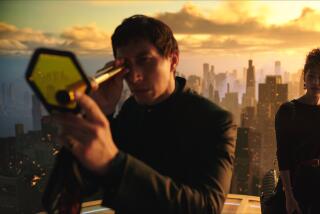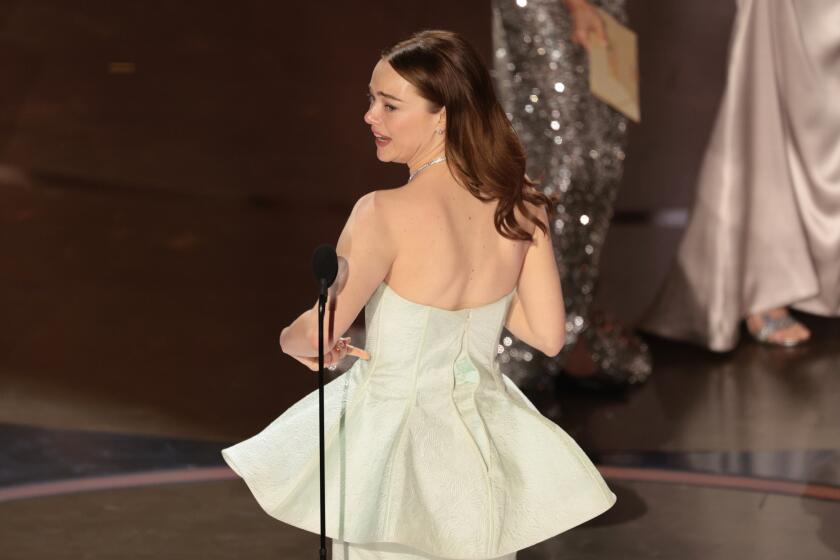A Writer Plays, and Loses, the Name Game
Admittedly, it’s not on the scale of Sammy “The Bull” Gravano, but nevertheless I feel as if I’ve been forced into some sort of Journalist Protection Program. I’m changing my name, forsaking Jeff Craig--my professional identity of more than 20 years.
In the pages of newspapers and magazines here and everywhere from Singapore to South Africa, my writing always began with my real name. But I can no longer be Jeff Craig. Thanks is in part to Sony Pictures recently admitting that its publicity department created a fake critic to baste the studio’s films with fake quotes from nonexistent reviews. The movies received monstrous praise from a Connecticut newspaper critic named David Manning. Though the newspaper is real, David Manning is not a real critic there.
I suffer a similar paradox. There’s another Jeff Craig, also in Connecticut, by some weird Douglas Adams’ holistic-sort-of coincidence. Though he happens to be a real person, he’s not a real critic. You may have seen his (our) name in newspaper ads triumphing movies that respected critics didn’t exactly drool over. My favorite, so to speak, was his over-the-top praise of that classic “Tank Girl”: “This movie kicks major butt!”
Jeff Craig is a voice bellowing from a syndicated radio clip called “Sixty Second Preview,” which I have never--and no one I know has ever, truth be told--actually heard. Still, he’s one of the most quoted critics in filmdom, despite the curious fact that he doesn’t actually see the movies he’s talking about or write the reviews--that’s done by freelance writers, two of whom I’ve met over the years.
I’m sure my critically challenged doppelgnger is a nice guy--with a name like that, how can he not be, the joke might go. But few legitimate critics or movie fans would disagree that the quotes attributed to him are of high standards. Certainly not Roger Ebert. One of my name-nemesis’ more vocal detractors, Ebert recently wrote, in part: “Has anyone ever actually seen Jeff Craig of ‘Sixty Second Preview’ at a movie?” Well, Roger ... no.
As Hollywood’s collective publicity machine admits it has created imaginary critics, imaginary quotes and even imaginary movie fans, in the form of paid actors or studio staff posing for testimonial television spots, I figured that a “fake” Jeff Craig was festering into a serious credibility threat to this Jeff Craig.
This was made even clearer to me when a national Canadian newspaper for which I write recently (and quite correctly) found it necessary to point out in an editor’s note in a Roger Ebert column that I am not the “Sixty Second Preview” Jeff Craig. I’d toyed with the idea of a name change for some time; I’ve never not been embarrassed to be mistaken for the “Sixty Second Preview” guy. Bowing to this instinct, I recently used my new moniker as co-writer of rock singer Eric Burdon’s new memoir, “Don’t Let Me Be Misunderstood,” being published this October.
*
But this whole movie writer business is fraught with conflict and the danger of impropriety. For some years I was the entertainment editor of the Edmonton Sun newspaper, as well as an entertainment writer and occasional critic there. I regularly attended movie junkets in New York and Los Angeles. Movie companies would fly me from Canada to put me up in a five-star hotel, buy me dinner and show me a movie. The next day, I spent 20 to 30 minutes interviewing the director and each star of the film.
That’s the deal--and generally the only way the studios grant access to the stars to all but the largest of media outlets. If I wanted to interview Mel Gibson or Sean Connery or Meg Ryan, I had to attend the junket. It’s still that way for the world’s regular junketeers, who provide much of the Hollywood celebrity interviews you read or see on TV.
Some believe this process is corrupt, charging that studios are essentially buying positive reviews, or at least favorable publicity, with the cost of an airplane ticket and a hotel room. In the Hollywood-themed comedy “America’s Sweethearts,” there’s a scene in which a studio executive tells his staff to put journalists in a really luxurious hotel so they won’t notice how bad the movie is.
Cute, but don’t believe it: Consider, despite any inclination to the contrary, the recent film “Pearl Harbor.” Disney spent a huge amount of money flying journalists to Hawaii for a spectacularly lavish junket; the Mouse had precious few glowing reviews to nibble on for its millions spent. When I’ve given a film a bad review--or written nasty things about interview subjects because of how objectionable he or she has behaved (Faye Dunaway ... yikes!) or because of how appallingly unhygienic he happened to be (Keanu Reeves in his distinctly unintelligible period) I was never rebuked by the studio brass, never threatened to be kicked off the junket list.
Never heard a peep. They were right when they said there’s no such thing as bad publicity. Of course, that didn’t stop one or two studios from taking my quotes out of context--a practice some continued until very recently. I’ll never forget the sinking feeling of opening the New York Times’ Arts section one Sunday to see my name under a quote for a film that I despised. In my review, I called the film “a disaster of magnificent proportions.” At the top of a full-page ad were massive letters: “Magnificent!” and just below it--Jeff Craig, Edmonton Sun.
Though I no longer write film reviews, I’m asked occasionally if I think junkets influenced my work. No, I answer. I don’t treat my work that lightly. I never tried to trick the public into attending bad films, and I certainly never sat down at my computer and started splashing exclamation points around the way Jackson Pollock painted. Despite the pain of changing my lifelong byline, at least now there will be no mistaking who’s doing that.
More to Read
Only good movies
Get the Indie Focus newsletter, Mark Olsen's weekly guide to the world of cinema.
You may occasionally receive promotional content from the Los Angeles Times.






